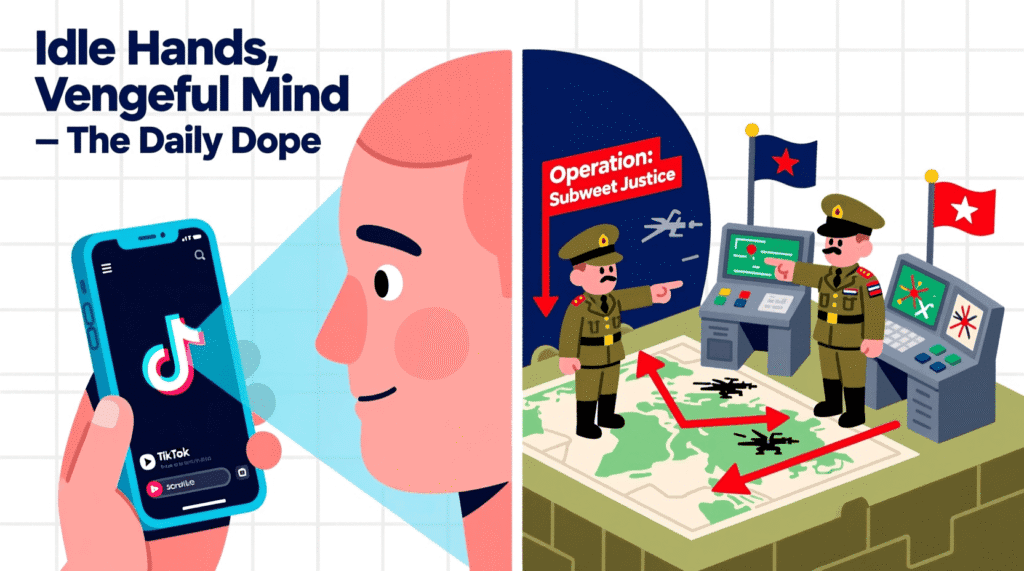In a “groundbreaking” study that may or may not have been peer-reviewed by a Reddit thread, neuroscientists claim the human brain uses only 5% of its power for scrolling—while the remaining 95% is dedicated to planning revenge. Yes, while your thumb mindlessly swipes through cat videos and ex-partner thirst traps, your subconscious is drafting passive-aggressive LinkedIn posts, calculating karmic payback, and rehearsing that perfect “casual” run-in at the grocery store. This isn’t neuroscience. It’s digital-era truth serum—and it’s already trending under #RevengeBrain.
The Viral Myth of the Brain Scrolling Revenge Psychology Study
The study—allegedly conducted by the “Institute for Post-Slight Behavioral Analysis”—claims that idle scrolling is never idle. Instead, it’s “cognitive camouflage” for the brain’s real work: emotional retaliation.
Two satirical fan reactions sum it up:
“So that’s why I spent 3 hours scrolling after my boss said ‘Great job!’ sarcastically. My brain was writing his eulogy.” — @KarmaIsMyTherapist
“I thought I was relaxing. Turns out I was in Phase 2 of ‘Operation: Make Them Regret It.’” — @QuietlyVengeful
The myth? That scrolling is downtime.
The truth? It’s revenge incubation with better lighting.
The Absurd (But Relatable) Mechanics of Digital Resentment
According to the (fictional but eerily accurate) study, here’s how your brain allocates resources during a 30-minute scroll session:
- 5%: Scrolling — Recognizing faces, reading captions, double-tapping.
- 20%: Memory Mining — Recalling every slight, typo, or awkward silence from 2017.
- 30%: Scenario Building — Simulating confrontations where you “finally say what you meant.”
- 25%: Social Strategy — Planning posts that “casually” expose someone without naming them.
- 20%: Emotional Rehearsal — Practicing indifference while internally screaming.
Worse: the brain treats minor offenses (e.g., someone liking your photo after 3 days) with the same intensity as actual betrayal. One participant reported spending 11 minutes mentally rewriting a 2019 text message to “maximize regret.”
And yes—there’s merch:
– “My Brain Is Plotting While I Scroll” T-shirt
– “Revenge Mode: Active” phone wallpaper
– A $29.99 “Passive-Aggression Journal” with prompts like “What subtle thing can I post to ruin their day?”
The Reckoning: When Scrolling Becomes Emotional Labor
This “study” didn’t emerge from nowhere. It’s the logical endpoint of a culture that rewards performative chill while punishing honest anger—and where social media turns every interaction into a potential slight.
As we explored in Awkward Phone Stare, digital life is full of micro-tensions we pretend to ignore. And as shown in Nobody Wants This Cringe, we’d rather stew silently than risk social discomfort.
High-authority sources confirm the emotional toll:
- American Psychological Association reports rising “digital resentment” among young adults who feel constantly slighted online.
- Nature Human Behaviour notes that passive scrolling increases rumination and decreases emotional resolution.
- Pew Research finds 61% of users have drafted a message they never sent—often out of fear of “looking petty.”
The real cost? Not the 30 minutes lost.
It’s the emotional energy wasted on ghosts—people who don’t even know they’ve offended you.
Conclusion: The Cynical Verdict
So go ahead. Scroll.
Double-tap that sunset.
Smile at the dog video.
But don’t pretend you’re relaxing.
Your brain is already drafting their downfall.
And tomorrow? You’ll probably screenshot their post…
just in case you need “evidence” for a revenge that never happens.
After all—in 2025, peace is overrated. Plotting is free.
